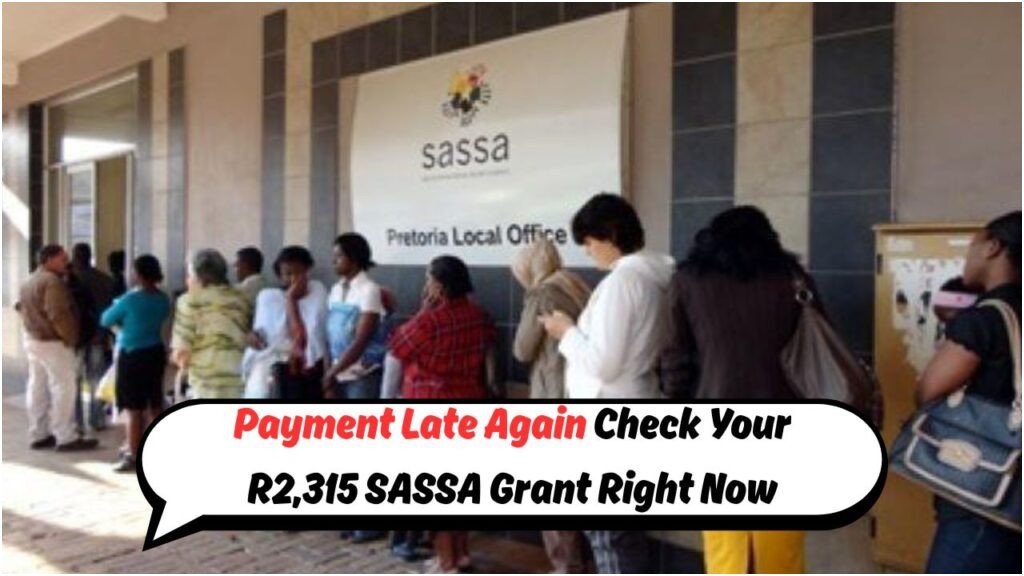Urgent Alert: SASSA Reveals R2,315 Payment Delay – Essential Steps to Take Before August 16: In a recent development, the South African Social Security Agency (SASSA) has announced a delay in the payment of R2,315, affecting numerous beneficiaries across the nation. This urgent alert has left many recipients concerned about their financial stability. As the payment deadline of August 16 approaches, it is crucial for beneficiaries to understand the steps they need to take to avoid any further disruptions. With the economic challenges that many South Africans face, timely access to social grants is vital for survival. This article provides a comprehensive guide on the essential actions beneficiaries should undertake during this critical period.
Understanding the SASSA Payment Delay Announcement
The announcement of a delay in SASSA payments has created a wave of concern among beneficiaries who rely heavily on these funds for their daily needs. SASSA has cited logistical issues as the primary cause of the delay, but they assure beneficiaries that efforts are underway to resolve the situation promptly. Understanding the reasons behind the delay can help beneficiaries better prepare for the financial impact. SASSA has emphasized the importance of patience and vigilance during this period, urging beneficiaries to stay informed through official communication channels. Meanwhile, beneficiaries should be cautious of misinformation and scams that may arise during such times of uncertainty.
- Stay updated with official SASSA announcements.
- Beware of scams and misinformation.
- Plan finances accordingly during the delay.
- Reach out to SASSA for any queries or clarifications.
- Utilize available community support services if needed.
- Ensure contact details are up-to-date with SASSA.
- Prepare necessary documentation for future claims.
- Consider alternative financial arrangements temporarily.
Steps to Take Before August 16 to Mitigate Financial Impact
With the deadline of August 16 approaching, beneficiaries must take proactive steps to manage their finances during this delay. First and foremost, reviewing and adjusting the household budget can help in prioritizing essential expenses. Beneficiaries should also explore interim financial support options, such as community food banks or short-term assistance from local NGOs. Additionally, maintaining open communication with creditors can provide some relief, as many institutions may offer grace periods or extensions during such times. Another critical step is to ensure that all personal information and banking details with SASSA are accurate to prevent any further payment issues.
- Review and adjust household budget.
- Explore interim financial support options.
- Communicate with creditors for possible extensions.
- Verify personal and banking information with SASSA.
- Stay informed about SASSA’s resolution progress.
Potential Solutions and Assistance Available to SASSA Beneficiaries
Amidst the payment delay, various resources and assistance programs are available to help SASSA beneficiaries cope with the financial strain. Local community centers often provide food parcels or emergency aid to those in need. Additionally, some financial institutions offer special relief packages for affected individuals, such as reduced interest rates or deferred payment plans. Beneficiaries should also consider reaching out to social workers for guidance on accessing government and non-government support programs. Staying connected with local support networks can provide valuable information and resources during this challenging time.
- Food parcel distributions
- Financial relief packages from banks
- Social worker assistance for accessing support programs
- Community support networks for information sharing
- Government emergency aid programs
- Non-profit organization support
How SASSA Plans to Address Future Payment Delays
SASSA is actively working on measures to prevent future payment delays and enhance the efficiency of the distribution process. They are implementing new technologies to streamline operations and improve communication between the agency and beneficiaries. SASSA also plans to increase staffing in critical areas to address bottlenecks and ensure timely disbursement of grants. Furthermore, they are collaborating with financial institutions to provide beneficiaries with more flexible banking options, which can help in minimizing disruptions during unforeseen circumstances. These initiatives aim to build a more resilient and responsive system for social grant distribution in South Africa.
- Implementation of new technologies for efficiency
- Increase in staffing for prompt service delivery
- Collaboration with banks for flexible options
- Enhanced communication with beneficiaries
Key Statistics on SASSA Beneficiary Impact
The SASSA payment delay has significant implications for a vast number of beneficiaries across South Africa. Recent statistics reveal that millions rely on these grants as their primary source of income, highlighting the critical role SASSA plays in supporting vulnerable communities. Understanding the scope and scale of this impact is essential for stakeholders and policymakers as they work towards more sustainable solutions.
| Year | Total Beneficiaries | Grants Affected | Estimated Financial Impact |
|---|---|---|---|
| 2020 | 18 million | Child Support, Old Age, Disability | R50 billion |
| 2021 | 19 million | Child Support, Old Age, Disability | R52 billion |
| 2022 | 20 million | Child Support, Old Age, Disability | R55 billion |
| 2023 | 21 million | Child Support, Old Age, Disability | R58 billion |
| 2024 | Projected 22 million | Child Support, Old Age, Disability | Projected R60 billion |
Exploring Financial Strategies During SASSA Payment Delays
For beneficiaries facing financial strain due to SASSA payment delays, developing strategic financial plans can provide a buffer during tough times. Creating a detailed budget, prioritizing essential purchases, and seeking community support are key steps. Additionally, beneficiaries should consider leveraging available government programs, such as food vouchers or temporary financial assistance, to alleviate immediate needs. Engaging with local financial advisors can also offer insights into managing limited resources effectively. By adopting these strategies, beneficiaries can navigate the challenges posed by delayed payments more confidently.
- Create a detailed and prioritized budget.
- Seek community and government support programs.
- Engage with financial advisors for resource management.
- Explore temporary financial assistance options.
| Assistance Program | Description | Eligibility | Application Process |
|---|---|---|---|
| Food Vouchers | Provides essential groceries | Low-income families | Apply at local community centers |
| Temporary Financial Aid | Short-term monetary support | Beneficiaries experiencing delays | Contact SASSA for details |
| Emergency Relief Fund | One-time financial assistance | Urgent cases | Application through social worker |
| Community Support Grants | Support for local projects | Community organizations | Submit proposal to government |
| Bank Relief Packages | Reduced rates or deferred payments | Bank clients affected by delays | Contact bank directly |
FAQ Section
What is causing the SASSA payment delay?
The delay is primarily due to logistical issues within the distribution process. SASSA is working to resolve these problems promptly.
How can I stay updated on the payment situation?
Stay informed through official SASSA announcements and avoid relying on unofficial sources that may spread misinformation.
Are there support options available for affected beneficiaries?
Yes, there are several options such as food parcels, financial relief packages from banks, and government aid programs.
What steps should I take before August 16?
Beneficiaries should review their budgets, explore interim support, and verify their personal information with SASSA.
How is SASSA planning to prevent future delays?
SASSA is implementing new technologies, increasing staff, and collaborating with banks to improve the efficiency of the grant distribution process.





